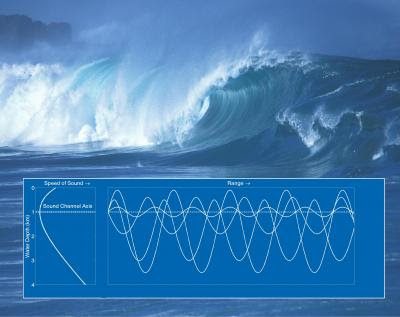The Oceans Are Getting Louder
We all know carbon emissions are making our planet warmer. But the increase in carbon brings with it other surprising problems. More carbon apparently means low sounds travel farther underwater, making the ocean a noisier place to live and work.
The reason is complex. Increased atmospheric carbon dioxide also means increased absorption of carbon in the Earth's oceans. And this increase, in turn, means more acidic sea water. More acidic oceans mean less absorption of sound at low frequencies.
And less sound absorption means louder noises over longer distances. In a paper published in Nature Geoscience, scientists predict that, within 100 years, absorption of sounds at around 200 Hz will go down by 70%, meaning sound could travel much farther.
The effects of less absorption and more noise at this frequency could be huge. For instance, scientists and commercial shipping vessels use these lower range frequencies for navigation and oceanic research. Also, marine mammals, such as whales, use these low frequencies for finding food and mates. Noisier oceans might cripple ocean navigation and interfere with whale life.
Unfortunately, the acidification of the ocean won't end when we stop polluting. In fact, the acidic shallow waters will propagate into the deeper ocean, where sound travels farthest, and possibly spread this noisy effect much farther than expected.
Recently, scientists found that blue whale songs are changing, drifting lower in pitch. Their research hinted at the deep complexity of marine life and the in-progress nature of this kind of science. This new marine acoustics research puts an additional wrinkle in the world of underwatercommunication, making the story more complex and even more interesting.
The reason is complex. Increased atmospheric carbon dioxide also means increased absorption of carbon in the Earth's oceans. And this increase, in turn, means more acidic sea water. More acidic oceans mean less absorption of sound at low frequencies.
And less sound absorption means louder noises over longer distances. In a paper published in Nature Geoscience, scientists predict that, within 100 years, absorption of sounds at around 200 Hz will go down by 70%, meaning sound could travel much farther.
The effects of less absorption and more noise at this frequency could be huge. For instance, scientists and commercial shipping vessels use these lower range frequencies for navigation and oceanic research. Also, marine mammals, such as whales, use these low frequencies for finding food and mates. Noisier oceans might cripple ocean navigation and interfere with whale life.
Unfortunately, the acidification of the ocean won't end when we stop polluting. In fact, the acidic shallow waters will propagate into the deeper ocean, where sound travels farthest, and possibly spread this noisy effect much farther than expected.
Recently, scientists found that blue whale songs are changing, drifting lower in pitch. Their research hinted at the deep complexity of marine life and the in-progress nature of this kind of science. This new marine acoustics research puts an additional wrinkle in the world of underwatercommunication, making the story more complex and even more interesting.



3 comments:
Wow, thats so interesting that the whales are reacting like that
the destruction of our oceans is some scary shit
this is very interesting
Post a Comment